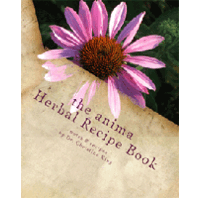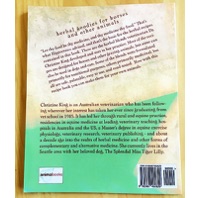

the anima
Herbal Recipe Book
notes & recipes by Dr Christine King
Publisher: Anima Books, 2011
Printing & Distribution: Kindle Direct Publishing
ISBN: 978-0-967-4926-2-9
Paperback, 8 x 10 in. (203 x 254 mm), 52 pages

herbal goodies for horses and other animals
"Let thy food be thy medicine, and thy medicine thy food." That's what Hippocrates advised, and that's the basis for the herbal recipes contained in this book. These are the herbal blends veterinarian Dr Christine King developed and uses in her practice. Most of the recipes are designed for horses and other grazing animals, but some can also be used in dogs and cats. Some of the blends were formulated primarily for nutritional purposes, others primarily medicinal, but all are safe, palatable, easy to use, and road-tested. Now with this recipe book you can make them for your own animals.
Christine King is an Australian veterinarian who has been following wherever her interest has taken her ever since graduating from vet school in 1985. It has led her through rural and equine practice, residencies in equine medicine at leading veterinary teaching hospitals in Australia and the US, a Master's degree in equine exercise physiology, veterinary research, veterinary publishing ‒ and about a decade ago into the realm of herbal medicine and other forms of complementary and alternative medicine. She currently lives in the Seattle area with her beloved dog, The Splendid Miss Tiger Lilly.
Excerpt from Chapter 1, Why Feed Herbs?
The horse's natural diet consists of many different grasses, legumes, and various other meadow and woodland plants. Naturalists estimate that wild or feral horses may browse from at least 50 different types of plants, depending on what's available in that location at that time. The variety comes not just from the range of plant species available, but also from the variations in plant types, parts (roots, stems, bark, leaves, flowers, fruit, seeds), and constituents with the different seasons.
One might argue that wild or feral horses eat this way because they must, simply to survive. There certainly is a "make do" element to the way wild or feral horses live in most parts of the world. But having practiced both conventionally and holistically during my veterinary career, I can attest to the health benefits gained by attempting to replicate that variety in the way we feed domesticated horses.
PRINT EDITION
USD: $24.95 | AUD: $37.70